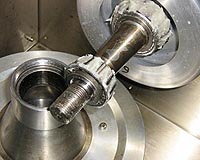| . |  |
. |
Tokyo (AFP) May 16, 2011 Japanese consumer confidence fell at the fastest pace on record in April from the previous month, data showed Monday, after March's earthquake, tsunami and a nuclear crisis cast a shadow on the economy. The data showed consumer sentiment worsening to a two-year low of 33.1 in April from 38.6 in March, when the index plunged after Japan's biggest recorded earthquake and a tsunami on March 11 that devastated the northeast coast. Readings below 50 indicate pessimism outweighing optimism. The 5.5 point drop month-on-month was the sharpest since records began in April 2004, according to the government. Although sales of water and food surged as people stockpiled immediately after the quake and the nuclear crisis at the Fukushima Daiichi plant, consumers have held off spending on areas such as entertainment and travel. Analysts have warned that voluntary self-restraint by consumers will exacerbate any downturn. Japan's consumer confidence has remained below its pre-financial crisis levels and retail sales slumped last year after government subsidies for car purchases were withdrawn and incentives to purchase appliances were reduced. Many see Japan sliding into a temporary recession after the quake and tsunami devastated infrastructure and manufacturing facilities in the northeast, plunging the nation into its worst crisis since World War II. Japan will report gross domestic product data for the January-March period on Thursday, and economists expect to see the second straight quarterly contraction due to the impact of the disasters. "While the earthquake occurred late in the quarter, the contraction in activity after the earthquake will likely be enough to bring down the growth rate in Q1 deep into negative territory," noted BNP Paribas' chief Japan economist Ryutaro Kono in a recent note to clients. In the aftermath of the disasters, output, activity and spending plunged while consumer and business confidence took a tumble. Japan has passed an emergency 4 trillion yen ($49 billion) relief budget to help fund reconstruction after the deadly March 11 earthquake and tsunami. "GDP could easily have fallen by 1.5 percent compared to Q4," said Capital Economics. "Given the unprecedented nature of the recent disaster there is a greater than normal degree of uncertainly in any forecasts, but we believe the risks to the consensus view are firmly on the downside." Analysts say however that GDP should start to grow again in the third quarter as initial earthquake-related disruption is overcome and reconstruction spending starts to boost the official figures.
Share This Article With Planet Earth
Related Links The Economy
 Japan core machinery orders up 2.9% in March
Japan core machinery orders up 2.9% in MarchTokyo (AFP) May 16, 2011 Japan's core machinery orders, a leading indicator of corporate capital spending, posted a surprise rise in March despite the devastating earthquake and tsunami, data showed Monday. The core private-sector machinery orders grew 2.9 percent from February, beating market expectations of a fall of more than nine percent due to the severity of the March 11 disaster. The positive core data, ... read more |
|
| The content herein, unless otherwise known to be public domain, are Copyright 1995-2010 - SpaceDaily. AFP and UPI Wire Stories are copyright Agence France-Presse and United Press International. ESA Portal Reports are copyright European Space Agency. All NASA sourced material is public domain. Additional copyrights may apply in whole or part to other bona fide parties. Advertising does not imply endorsement,agreement or approval of any opinions, statements or information provided by SpaceDaily on any Web page published or hosted by SpaceDaily. Privacy Statement |